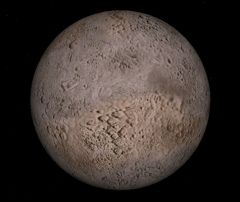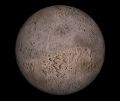Setebos
Setebos (Uranus XIX, S/1999 U 1) the outermost retrograde irregular moons of Uranus. It was discovered by John J Kavelaars et al on 18 July 1999. It is named for the god worshipped by Caliban and Sycorax in William Shakespeare's The Tempest.
Setebos in Orbiter
Setebos was released in the add-on uranus-neptune_ii.zip in March 2003.
| Add-on | Source | Version | Author | Type | Release Date | Compatibility | Wiki article |
|---|---|---|---|---|---|---|---|
| Uranus-Neptune II | AVSIM | Rolf B Keibel | Scenery | 6 March 2003 | |||
See also
Gallery
| Uranus's natural satellites |
|---|
| Named Satellites:
Ariel | Belinda | Bianca | Caliban | Cordelia | Cressida | Cupid | Desdemona | Ferdinand | Francisco | Juliet | Mab | Margaret | Miranda | Oberon | Ophelia | Perdita | Portia | Prospero | Puck | Rosalind | Setebos | Stephano | Sycorax | Titania | Trinculo | Umbriel Numbered Satellites: |
| See also: Pronunciation key | rings of Uranus |
| edit The Solar System | |
|---|---|
| Central star |
Sun (Sol) |
| Planets |
Mercury - Venus - Earth - Mars - Jupiter - Saturn - Uranus - Neptune |
| Natural satellites |
Moon - Phobos - Deimos - Io - Europa - Ganymede - Titan - more... |
| Add-ons |
Planets - Dwarf Planets - Small objects - Natural satellites - Alternative star systems |
 | This natural satellite related article is a stub. You can help Orbiterwiki by expanding it.
|


